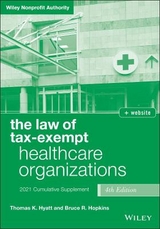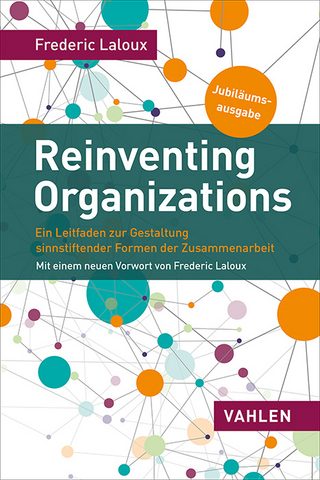
The Law of Tax–Exempt Healthcare Organizations
John Wiley & Sons Inc (Verlag)
978-1-119-63913-8 (ISBN)
- Titel ist leider vergriffen;
keine Neuauflage - Artikel merken
In the Fourth Edition of The Law of Tax-Exempt Healthcare Organizations, distinguished counsel and authors Thomas K. Hyatt and Bruce R. Hopkins deliver a comprehensive treatment of the complex legal issues involved in managing, advising, and leading tax-exempt healthcare organizations. The guide is a one-stop resource containing accurate and concise information and analysis ideal for legal counsel and other professionals serving healthcare organizations.
The 2021 Cumulative Supplement offers readers a thorough and complete update to the law. You’ll learn about:
New constitutional issues for the Patient Protection and Affordable Care Act
New issues surrounding the commerciality doctrine
Changes to the definition of “hospital” in federal tax law
The implications of The Coronavirus Aid, Relief, and Economic Security (CARES) Act
The 2021 Cumulative Supplement to the Fourth Edition of The Law of Tax-Exempt Healthcare Organizations brings an already expansive and indispensable resource fully up to date. It’s coverage of all relevant and recent legal issues is unmatched.
THOMAS K. HYATT (Washington DC) is a Partner and the Chair of SNR Denton's Health Care practice. He focuses on corporate and tax-exempt organization issues for health care providers. He represents organizations including public and private hospitals, multi-hospital systems, integrated delivery systems, academic medical centers, home health agencies, health maintenance organizations, continuing care retirement communities, provider associations, physician clinics, faculty practice plans, physician-hospital organizations and shared services organizations. Tom is the Chair Emeritus and serves on the faculty of the annual Tax Issues in Healthcare Organizations seminar sponsored by the American Health Lawyers Association (AHLA), and past Chair of AHLA's Tax and Finance practice. BRUCE R. HOPKINS (Kansas City MO) is a senior partner with the firm Polsinelli Shughart PC. He is also the author of more than 35 books, including The Law of Tax-Exempt Organizations, 10e, The Law of Fundraising, 4e, Nonprofit Law for Colleges and Universities, Nonprofit Governance, and Nonprofit Law Made Easy, as well as the monthly newsletter Bruce R. Hopkins' Nonprofit Counsel, all published by Wiley. Hopkins earned his Juris Doctorate and Master of Laws degrees at the George Washington University. He has practiced law for 40 years and is a member of the District of Columbia and Missouri bars. Hopkins received the 2007 Outstanding Nonprofit Lawyer Award (Vanguard Lifetime Achievement Award) from the American Bar Association, Section of Business Law, and Committee on Nonprofit Corporations. He is listed in The Best Lawyers in America, Nonprofit Organizations/Charities Law, 2007-2008.
Preface ix
About the Authors xi
Book Citations xv
1 Tax-Exempt Healthcare Organizations: An Overview 1
§ 1.2 Defining Tax-Exempt Organizations 1
§ 1.5 Charitable Healthcare Organizations 1
§ 1.8 Promotion of Health 2
§ 1.10 ABLE Programs 2
3 Public Charities and Private Foundations (New) 5
*§ 3.3 Commerciality Doctrine 5
4 Private Inurement, Private Benefit, and Excess Benefit Transactions 11
*§ 4.4 Private Inurement—Scope and Types 11
§ 4.6 Essence of Private Benefit 13
*§ 4.9 Excess Benefit Transactions 14
5 Public Charities and Private Foundations 17
*§ 5.1 Public Institutions 17
*§ 5.6 Recognition of Change in Public Charity Status 18
7 Lobbying and Political Activities 19
*§ 7.1 Legislative Activities Limitation 19
§ 7.4 Political Activities Limitation 20
§ 7.5 Business Expense Deduction Rules and Political Activities 23
§ 7.7 Public Policy Advocacy Activities 23
§ 7.8 Political Activities of Social Welfare Organizations 23
8 Hospitals 25
§ 8.3 Public Hospitals 25
9 Managed Care Organizations 27
§ 9.3 Commercial-Type Insurance Providers 27
§ 9.5 Recent Developments 27
13 Other Provider and Supplier Organizations 31
§ 13.3 Qualified Nonprofit Health Insurance Issuers 31
§ 13.5 Accountable Care Organizations 32
*§ 13.6 Cannabis-Related Services Organizations 35
16 For-Profit Subsidiaries 39
§ 16.3 Attribution of Subsidiary’s Activities to Exempt Parent 39
17 Exempt and Nonexempt Cooperatives 41
§ 17.1 Cooperative Hospital Service Organizations 41
18 Business Leagues 43
*§ 18.1 Business Leagues in General 43
§ 18.2 Healthcare Trade Associations 44
*§ 18.3 Certification Organizations and Peer Review Boards 45
19 Other Health-Related Organizations 47
§ 19.4 Hospital Management Services Organizations 47
§ 19.5 Regional Health Information Organizations 48
20 Healthcare Provider Reorganizations 49
§ 20.1 Some Basics about Reorganizations 49
21 Mergers and Conversions 51
§ 21.4 Conversion from Nonexempt to Exempt Status 51
*§ 21.5 Joint Operating Agreements 51
22 Partnerships and Joint Ventures (New) 53
§ 22.9 Whole-Hospital Joint Ventures 53
24 Tax Treatment of Unrelated Business Activities 55
*§ 24.2 Definition of Trade or Business 55
§ 24.3 Definition of Regularly Carried On 58
§ 24.5 Application of Substantially Related Test to Healthcare Organizations 58
*§ 24.5A Deemed Unrelated Business Income 59
§ 24.11 Pharmacy, Medical Supplies, and Service Sales 59
§ 24.12 Laboratory Testing Services 60
§ 24.13 Medical Research 60
*§ 24.18 Other Exceptions to Unrelated Income Taxation 62
§ 24.20 Revenue from Controlled Organizations 64
*§ 24.20A Partnership Rules 64
§ 24.21 Unrelated Debt-Financed Income 65
*§ 24.23 Computation of Unrelated Business Taxable Income 65
25 Physician Recruitment and Retention 75
§ 25.5 Specific Recruitment and Retention Techniques 75
26 Charity Care 77
§ 26.6 Definitional and Reporting Issues 77
§ 26.9 Charity Care and National Health Reform 78
§ 26.10 Additional Statutory Requirements for Hospitals 78
§ 26.12 Provider Taxes (New) 96
27 Worker Classification and Employment Taxes 99
§ 27.7 Medical Residents and the Student Exception 99
28 Compensation and Employee Benefits 101
*§ 28.3 Executive Compensation 101
§ 28.5 Overview of Employee Benefits Law 102
§ 28.6 Deferred Compensation in General 103
*§ 28.7 Excess Executive Compensation (New) 106
30 Tax-Exempt Bond Financing 117
§ 30.3 Disqualification of Tax-Exempt Bonds 117
31 Fundraising Regulation 127
*§ 31.2 Federal Law Regulation 127
33 Governance 129
*§ 33.3 Good Governance Practices 129
§ 33.4A IRS Ruling Policy 131
34 Exemption and Public Charity Recognition Processes 135
*§ 34.1 Exemption Recognition Process 135
*§ 34.5 Public Charity Status 145
*§ 34.6 Group Exemption 146
§ 34.7A Notice Requirements for Social Welfare Organizations (New) 146
*§ 34.8 Procedure Where Determination is Adverse 147
*§ 34.9 Constitutional Law Aspects of Process 149
35 Maintenance of Tax-Exempt Status and Avoidance of Penalties 153
§ 35.1 Material Changes 153
§ 35.2A Modification of Tax Exemption (New) 155
§ 35.4 Redesigned Annual Information Return 155
§ 35.5 Disclosure Requirements 156
*§ 35.6 IRS Disclosure to State Officials 157
36 IRS Audits of Healthcare Organizations 159
*§ 36.2 Audit Procedures 159
Cumulative Table of Cases 167
Cumulative Table of IRS Revenue Rulings 179
Cumulative Table of IRS Revenue Procedures 183
Cumulative Table of IRS Private Letter Rulings 185
Cumulative Table of IRS Technical Advice Memoranda 191
Table of Chief Counsel Advice Memoranda 193
Cumulative Table of IRS General Counsel Memoranda 195
Table of Tax Reform Legislation 197
Cumulative Index 203
| Erscheinungsdatum | 17.07.2020 |
|---|---|
| Reihe/Serie | Wiley Nonprofit Authority |
| Verlagsort | New York |
| Sprache | englisch |
| Maße | 178 x 257 mm |
| Gewicht | 386 g |
| Themenwelt | Technik |
| Wirtschaft ► Betriebswirtschaft / Management ► Planung / Organisation | |
| ISBN-10 | 1-119-63913-1 / 1119639131 |
| ISBN-13 | 978-1-119-63913-8 / 9781119639138 |
| Zustand | Neuware |
| Haben Sie eine Frage zum Produkt? |
aus dem Bereich



